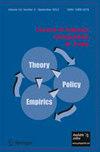Backward Partial Vertical Integration Through Private Placement
IF 0.6
Q4 BUSINESS
引用次数: 1
通过私募进行反向部分垂直整合
本文章由计算机程序翻译,如有差异,请以英文原文为准。
求助全文
约1分钟内获得全文
求助全文
来源期刊

Journal of Industry Competition & Trade
BUSINESS-
CiteScore
3.10
自引率
5.30%
发文量
15
期刊介绍:
The Journal of Industry, Competition and Trade (JICT) publishes research on the microeconomic foundations of industrial strategy, innovation, competition, and trade policy, concentrating on the functioning of markets for goods and services. The journal’s primary aim is to bridge the gaps between economic theory, empirical analysis and economic policy, and to provide a forum for applied theoretical research on policy questions. Journal of Industry, Competition and Trade promotes the combination of theories with facts, and encourages the incorporation of facts into model building. focuses on using applied theoretical research to arrive at policy conclusions, and encourages researchers to investigate policy questions. For example, game theoretical models that analyse the sources of and obstacles to innovation, the functioning of markets or strategic interactions are combined with empirical facts; and supporting empirical analysis is provided for models that explain how institutions, consumers and firms interact, how they shape their environment, and how incentives influence behaviour. Papers that analyse institutions and policy measures are expected to make explicit reference to theoretical models, while theoretical work is expected to include the analysis of empirical implications. The journal serves as a forum for dialogue between economists from academia and (national or international) policy circles. The composition of the Editorial Board, which includes academics as well as leading economists working at governmental and international organizations, facilitates exchanges between academia and economic policy. Officially cited as: J Ind Compet Trade
 求助内容:
求助内容: 应助结果提醒方式:
应助结果提醒方式:


